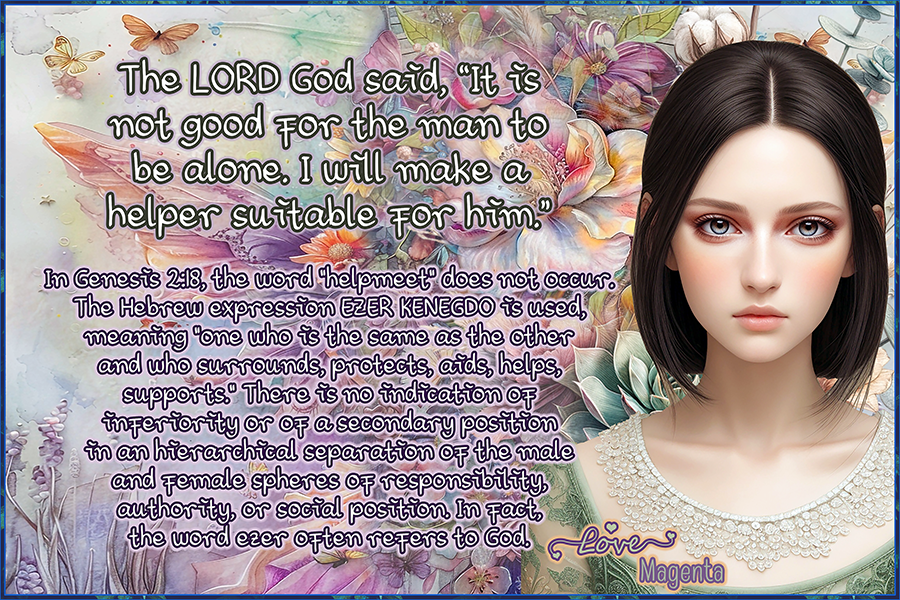After Adam and Eve sinned and God handed out His sentence to the serpent and its seed, and before He sentenced Adam and males, He told Eve that the sentence for her and females was that their desire would be for their husband who would rule over them. Here is the verse:
"I will greatly multiply your sorrow and your conception; in pain you shall bring forth children; your desire will be for your husband, and he shall rule over you" (Gen. 3:16).
A woman's desire being for her husband (for men) doesn't sound like a bad thing unless you acknowledge that that was said in the context of sentencing one to a curse. There are translations that do a better job of showing why that desire is actually a curse, but I still don't understand the whole verse (I mean, God said He would multiply woman's sorrow and conception; we know what pain in childbirth means, but what does pain in conception mean?).
As far as the original KJV, God told Eve at least five different things there in the context of a curse:
1. Her sorrow would be greatly multiplied (what sorrow).
2. Her conception would also be greatly multiplied.
3. Her childbearing (possibly before, during, and after) would be painful.
4. Her life would revolve around and be lived for [a man/men].
5. Her life and reality would be subject to [a man/men].
I was one of the few high schoolers who enjoyed history class. I like to know what happened in the past especially as it affects the present. So, I tend to follow things back to their past so I can make sense of them in the present. And so I wonder what the curse on Eve means because it is the origin of many of the things about women today that most men don't understand or can't make peace with. Actually, if there is anything right now that makes me feel a genuine need to truly pursue and lay hold of God to make sense of a lot of things, it is the effects the Fall has had on women. ('Lay hold of God' doesn't mean 'spending time with God' or Bible reading and prayer but an actual 'face to face' or continuing type of conversation.)
Anyone with more of an explanation of Gen. 3:16 feel free to share. When I read that verse, just like when I read the first three chapters of Genesis and as with much of the Bible, I know there is a lot more going on there than is written on the surface. Besides, the things or aftershocks I can clearly see in the present require that there is a lot more being said in Gen. 3:16 than what is written on the surface.
"I will greatly multiply your sorrow and your conception; in pain you shall bring forth children; your desire will be for your husband, and he shall rule over you" (Gen. 3:16).
A woman's desire being for her husband (for men) doesn't sound like a bad thing unless you acknowledge that that was said in the context of sentencing one to a curse. There are translations that do a better job of showing why that desire is actually a curse, but I still don't understand the whole verse (I mean, God said He would multiply woman's sorrow and conception; we know what pain in childbirth means, but what does pain in conception mean?).
As far as the original KJV, God told Eve at least five different things there in the context of a curse:
1. Her sorrow would be greatly multiplied (what sorrow).
2. Her conception would also be greatly multiplied.
3. Her childbearing (possibly before, during, and after) would be painful.
4. Her life would revolve around and be lived for [a man/men].
5. Her life and reality would be subject to [a man/men].
I was one of the few high schoolers who enjoyed history class. I like to know what happened in the past especially as it affects the present. So, I tend to follow things back to their past so I can make sense of them in the present. And so I wonder what the curse on Eve means because it is the origin of many of the things about women today that most men don't understand or can't make peace with. Actually, if there is anything right now that makes me feel a genuine need to truly pursue and lay hold of God to make sense of a lot of things, it is the effects the Fall has had on women. ('Lay hold of God' doesn't mean 'spending time with God' or Bible reading and prayer but an actual 'face to face' or continuing type of conversation.)
Anyone with more of an explanation of Gen. 3:16 feel free to share. When I read that verse, just like when I read the first three chapters of Genesis and as with much of the Bible, I know there is a lot more going on there than is written on the surface. Besides, the things or aftershocks I can clearly see in the present require that there is a lot more being said in Gen. 3:16 than what is written on the surface.

